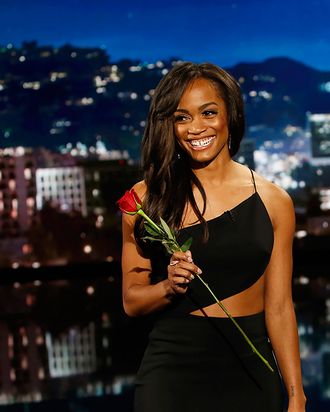
On last night’s “After the Final Rose,” new Bachelorette Rachel Lindsay was subjected to one of Bachelor nation’s dreaded ‘shake-ups.’ In a move that smartly distracted audience attention away from the train wreck of Nick and Vanessa’s nascent relationship, Chris Harrison decided to introduce Rachel to four of her future suitors live onstage: two black contestants, Demario and Eric, and two white contestants, Dean and Blake.
While it’s too soon to tell how exactly the show will navigate having its first black Bachelorette after 33 seasons of blinding whiteness — and I’m not too optimistic, given the show’s track record — this stunt provides an entry point into one of the most interesting questions the season is likely to raise: Who will the contestants be? As Linda Holmes pointed out in a recent piece for NPR, Rachel’s selection might be a Bachelor milestone, but the more significant insight into the show’s racial politics would come with the choice of suitors: “That’s where you’ll get the hint about what the real rules are.”
For the majority of the show’s run, white Bachelor/ettes have dated mostly white contestants. This suggests, Holmes writes, “Certain Unspoken Ideas About Compatibility” — namely, that white people are more compatible with white people. (Otherwise, why wouldn’t there be more contestants of color?) If the show were to continue its adherence to these Unspoken Ideas — ideas that Holmes herself certainly isn’t endorsing — you might expect Rachel to be given more black suitors. (Unless, of course, the show’s unspoken logic is actually that both white and black people want to date white people.)
But if the show does cast majority black contestants, or even 50/50, the franchise would be in an interesting position. Given that the next season’s star is historically chosen from among the runner-ups (a beloved “tradition” that producers have leaned on as the main reason they weren’t casting people of color), more diversity in the contestant pool means a higher chance that the next Bachelor or Bachelorette will be a person of color too. The structure has been “a way for the centrality of white leads to perpetuate itself,” Holmes writes — but it could become a mechanism for change.
Last night seemed to suggest producers had opted for a contestant pool split down the middle by race. It will be fascinating to see which forces will prove to be strongest: the show’s unspoken beliefs about compatibility and its emphasis on time-tested Bachelor traditions, or its longstanding resistance to diversity and change.
No matter what happens, you can bet there are going to be a lot of awkward moments in Rachel’s future. As Dean said last night, goofy grin on his face: “I’m ready to go black and I’m never going to go back.” Oh boy, here we go.




